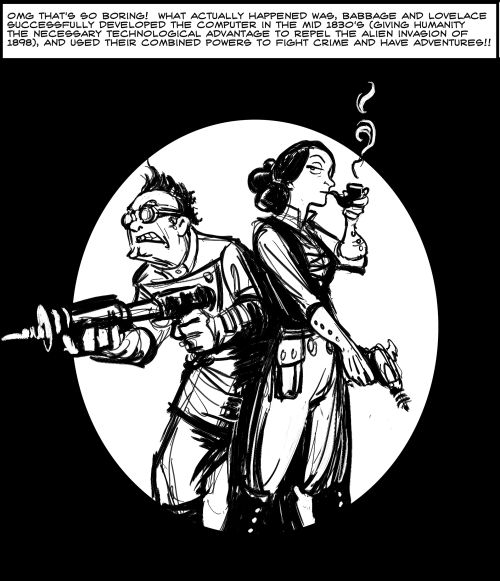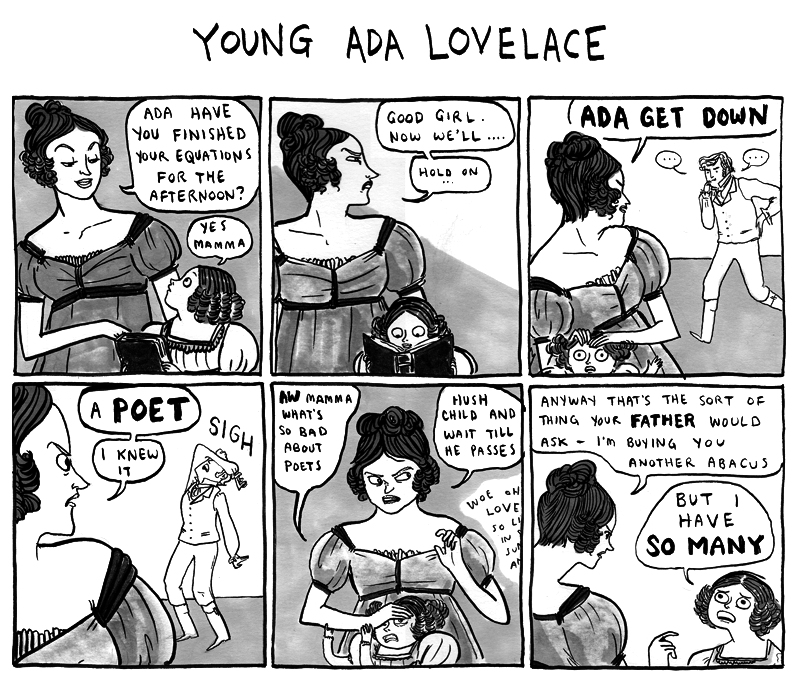Serendip is an independent site partnering with faculty at multiple colleges and universities around the world. Happy exploring!
GIST

![]()
Welcome to "GIST": A Course about Gender, Information, Science and Technology, offered in Spring 2011 @ Bryn Mawr College. This is an interestingly different kind of place for writing, and may take some getting used to. The first thing to keep in mind is that this is not a place for "formal writing" or "finished thoughts." It's a place for thoughts-in-progress, for what you're thinking (whether you know it or not) on your way to what you think next. Imagine that you're not worrying about "writing" but instead that you're just talking to some people you've met. This is a "conversation" place, a place to find out what you're thinking yourself, and what other people are thinking, so you can help them think and they can help you think. The idea is that your "thoughts in progress" can help others with their thinking, and theirs can help you with yours.
We're glad you're here, and hope you'll come both to enjoy and value our shared imagining of the future evolution of ourselves as individuals and of our gendered, scientific, technological world. Feel free to comment on any post below, or to POST YOUR THOUGHTS HERE....

Hyper Reading - What's harder?
In Hayes' article "How We Read: Close, Hyper, Machine", there is much discussion of two points that seem contradictory to me:

Forgiving "Ada"
This week, I was the first to admit that the film "Conceiving Ada" didn't really do it for me. I was quick to judge its clunky technology, unrealistic elements, and unconventional protagonist. When Anne pushed my discussion group to go beyond these surface reactions and think about how we might "forget meaning" and see what extensions we can learn from such a film, I was resistant. I thought, "There's nothing to learn if it's all fake and impossible." But when I posted about my panel character for next week, I saw startling similarities between my beloved "Fringe" and this movie that had rubbed me the wrong way. They both deal in impossible technologies, sharing a focus on finding or extracting information that seems lost forever.

Communication Technology
When I think of historical and contemporary examples of technology that have significantly impacted the human race, the first things that come to mind are computers, cell phones, mp3 players, cameras, radios, cars, and airplanes. While looking at this list I noticed an interesting pattern. Most of these “pieces” of technology somehow directly relate to the idea of communication. Human beings are social creatures, and it is no wonder that our attitudes toward technology reflect this.

Gender and how our brains work
After getting past some of the general difficulties I had with Conceiving Ada, I tried to get past the far-fetched idea of the movie and think about how gender roles functioned within it. For Ada, having children is a full-time job, something that as a woman, must take over her life and stop her from pursuing her own goals. Similarly, Emmy's pregnancy frightens her at first and from looking at her life with her boyfriend, it seems clear that her work comes before any personal relationships do. In a way, her daughter becomes her work because she is a clone of Ada, another "experiment" for Emmy to explore.
Teaching the digital humanities
When we were in groups trying to link the articles to the movie, we ran into some trouble near the end questions, about how we would teach it using Hayles’ ideas.
technology changing our brains
After reading How we Read, I have been fascinated by the ability of technology to effect the workings of our brains. They say that video games and search engines create and strengthen neural pathways and potentially weaken old ones. But doesn't this sound a bit scary? It suggests that the structure of our brain is physically being changed by technology!
There was one study conducted at Harvard university in which people without prior experience playing the piano were separated into 3 groups. One group had intense piano lessons for 5 days. There was a second control group who did nothing. The third group, however, was taken into the room with the piano and told to "imagine" they were getting lessons and being instructed…

What’s so Good about the Good Old Days?
People always talk about “The Good Old Days”- the days without internet, when life was simple and easy. But what, really, was so great about those days?
Digital Humanities-- an advantage, or disadvantage?
As an English major at Haverford, I’ve found Hayles’ two articles to be particularly interesting. The idea of transforming/altering humanitarian disciplines in order to transition into a more digitized humanities is something I’m still not sure I entirely support. I think that both close reading and hyper reading are important—both are legitimate avenues to critical thinking. As someone who spends the majority of my time bogged down by close reading hundreds of pages per week, I realize the advantage, and, in fact, the necessity, of developing the skill of hyper-reading. That being said, I’ve made a point to do all the readings for this class primarily online.

Why you so obsessed with me?
After watching and discussing Conceiving Ada all I could think about was obsession. Emmy was pretty obsessed with Ada, let's be honest. She was fascinated with her life, and her influence on technology as we know it, so much so that Emmy ended up literally conceiving Ada, giving birth to a "reincarnation" of her or however you'd like to phrase it. Taking a step back, I found myself comparing Emmy's "obsession" with Ada to technology addiction today. Many scientists are suggesting that the addiction to technology is an actual psychological disorder, not just a social problem.

Interpreting GIST & Ada/ Questioning our Survival
So this week I'm supposed to post information about the historical or contemporary difference(s) technology makes. Well…. This week’s discussion of Conceiving Ada was interesting. I was pleasantly surprised that the class picked up on different aspects of the movie. Our minds are trained to think in such various ways that I do not why I’m surprised when people don’t think like me and vice versa. It’s funny how some of us had expectations based on what we wanted to see versus being open to interpreting the movie entirely, whether based on our training our academic expertise or not.
post for 02/25
Technology has shaped human life in various ways; people can travel faster, live longer, learn more effectively, etc. What I think is the most important difference that technology makes is increasing the availability of various resources, which gives humans a number of choices when making a decision; couple of examples related to gender and information that are discussed in the class evidently show such phenomena.

2/23/11 Group 4 Discussion on Conceiving Ada
CONCEIVING ADA GROUP 4 DISCUSSION
1. What was your response to the film?
Exchange of Knowledge for sex
It wasn’t a fantasy watching Ada and being pregnant
Ada was humanizing machines
Software having knowledge of real life in terms of Emmy having 1st cyber born human
2. What questions does the film raise for you?
How possible is this?
While watching movie it seemed like it was filmed in current day – during the era in which it was filmed
Analogy of death- and Ada being timeless through virtuality
Emmy’s daughter embodied Ada, or did she rebirth Ada?
reviewing the pattern our minds made
Click on the attachment to see a pie chart of our responses to the question:
My classmate's mind is.....
It was a challenge to make meaning out of this information!
Give it a try if you'd like.

Who Do You Want to Be?
Please "add a new comment" to this posting, and tell us who you will "be" (or @ least perform!)
in the panels we are hosting next Monday and Wednesday.
You should come to class prepared to say
* what role gender played in "your" life
* what role science and/or technology played
* how they intersected
* in what ways they “reciprocally shaped one another."
In "your" day, what language did you use
* to talk about “gender” and “technology”?
* did "you" use these words, or other ones?
* for example: how did "you" understand the
difference between “natural” and “artificial”?
Video- Information R/evolvtion
This is an amazing video that seems tailor made for this class
http://www.youtube.com/watch?v=-4CV05HyAbM

Class Notes 2/21/2011
Class Notes 2/21
Coursekeeping:
For Wednesday: Watch the 85 minute movie "Conceiving Ada" which is on reserve at Canaday library. Think about the movie in response to Hayles' call for new media and think about how you would handle this material in a 'digital humanities' mode.
For next week: Come to class prepared to 'speak as' an individual whose life or work circumstances shaped, or were impacted by, an interesting interaction of gender, information, science and/or technology. Chose your person by Friday and include this in your post. The reading for next week is in preparation for this.
Section 1:

Human | Animal | Meaning
The This American Life podcast this week had an interesting "act" about a couple who raised a chimp (Lucy) as a human until Lucy was too big and strong to live with them and moved to an island off the coast of Gambia where a woman acted like a chimp in order to teach Lucy to be a chimp. The story raised a lot of the questions we have been discussing about human/ animal relationships as well as meaning. Was the relationship between Lucy and her "parents" and then Lucy and Janis, the woman who taught her to be a chimp, a meaningful one?
You can listen to the episode for free here:
http://www.thisamericanlife.org/

THE THRILLING ADVENTURES OF LOVELACE AND BABBAGE

Class Notes Monday 2-21
- Coursekeeping:
- Watch film in preparation for a panel discussion (Conceiving Ada)

Information vs. Noise, John Cage vs. Merzbow
Merzbow takes its name from the word “merz”. In reference to Dadaism and surrealism, merz means art made of rubbish. I was wondering how Merzbow would be taken as a live performance, so I searched and found the following:
I’m not an authority on what is and isn’t art, but it’s hard for me to see something performed so casually as important as a meticulously composed piece of music.




